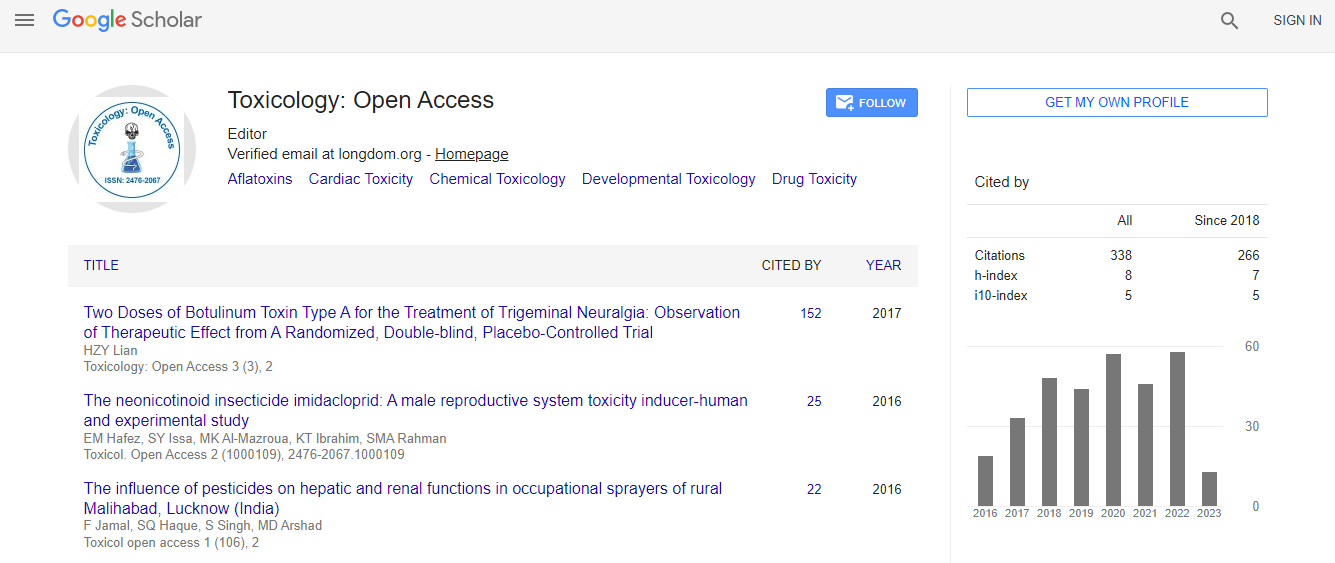Our Group organises 3000+ Global Conferenceseries Events every year across USA, Europe & Asia with support from 1000 more scientific Societies and Publishes 700+ Open Access Journals which contains over 50000 eminent personalities, reputed scientists as editorial board members.
Open Access Journals gaining more Readers and Citations
700 Journals and 15,000,000 Readers Each Journal is getting 25,000+ Readers
Google Scholar citation report
Citations : 336
Toxicology: Open Access received 336 citations as per Google Scholar report
Indexed In
- Google Scholar
- RefSeek
- Hamdard University
- EBSCO A-Z
- Geneva Foundation for Medical Education and Research
- Euro Pub
- ICMJE
Useful Links
Related Subjects
Share This Page
Effect of low-intensity 900 MHz frequency electromagnetic radiation on rat brain redox status and cholinesterase activity linked to working memory
8th World Congress on Toxicology and Pharmacology
Samta Sharma and Sangeeta Shukla
Jiwaji University, India
ScientificTracks Abstracts: Toxicol Open Access
Abstract
Statement of the Problem: Behavioural impairments are the most empirical consequence of long-term mobile uses, but the underlying causes are still poorly understood. Until now no study has been proposed to investigate the underlying causes of behavioural effects induced by microwave exposure. Thus, the present study was undertaken to determine the influence of microwave radiation on redox status, oxidative stress, cholinesterase activity, DNA damage and cognitive alterations in rat brain. Methodology & Theoretical Orientation: The study was carried out on 24 male Wistar rats, randomly divided into four groups (n=6 in each group): Group I consisted of sham exposed (control) rats, group II, III and IV consisted of rats exposed to microwave radiation (900 MHz) at different time duration 1h, 2h and 4h respectively (5 days/week). Rats were sacrificed and decapitated to isolate. Findings: Microwave exposure resulted in a time dependent significant increase in oxidative stress markers viz. malondialdehyde (MDA) and catalase (CAT) in microwave exposed groups in comparison to sham exposed group (p<0.05). But, the levels of superoxide dismutase (SOD) were found significantly decreased in microwave exposed groups (p<0.05). A significant alteration in redox status was observed in microwave exposed animals (p<0.05). Furthermore, significant depletion in cholinesterase activity and DNA damage was also observed in microwave exposed groups as compared to their corresponding values in sham exposed group (p<0.05). Results: In conclusion, the present study suggests that microwave radiation induces oxidative stress, depleted redox status, DNA damage and reduces working memory in brain by exerting a time dependent effect.Biography
Samta Sharma is a Research Associate in an ICMR funded project. She has completed her Doctorate in Life Sciences. She has published scientific paper and a book, also has got awards in conferences.
Email: samta46@yahoo.co.in

 Spanish
Spanish  Chinese
Chinese  Russian
Russian  German
German  French
French  Japanese
Japanese  Portuguese
Portuguese  Hindi
Hindi 